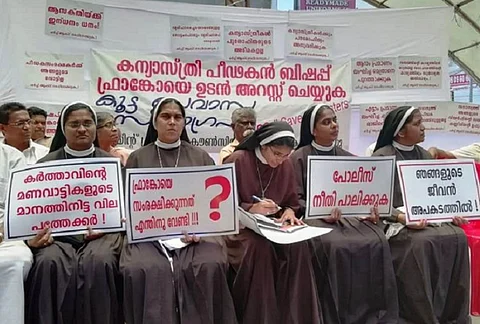

September saw Kerala rocked by protests as five nuns from the Kuravilangad convent agitated outside the High Court demanding justice for their colleague, who accused Bishop Franco Mulakkal of the Jalandhar Diocese of raping her multiple times between 2014 and 2016. The protests finally wound up on Friday, September 21, when the Bishop was arrested by the police.
But the church now has a new worry. Sources in the know say that the number of women applying to become nuns has seen a decline in the last few years. “The recent synod of the Syro Malabar Church has decided to study this decline. If this continues, in the next 15 years, most nunneries will have to close as there aren’t enough people in them,” a source said.
A senior priest belonging to the Jalandhar Diocese said parents weren’t willing to send their daughters to the convent. “This has exposed the weakness of the church. There is a notion that the church sided with the hound and not with the hare in this case,” he added.
In 2015, there were 1,09,2018 Christian families in the Ernakulam-Angamaly Archdiocese, and there were 1,742 priests and 6,781 nuns. A senior priest from the Archdiocese said, “At present, the number of youths in the seminary is 735, and the number of nuns is just 210. It is not just here; this is a trend we see throughout the state.”
The Palai diocese has historically boasted of a high number of seminarians and novices, but it has dropped here too. “Earlier, around 800 aspirants used to join the church, of which 500 alone were nuns. But it has not fallen to 200 aspirants, and only 50 are nuns,” a source said.
Dr Paul Thelakkat, former spokesperson of the Syro Malabar Church, tells TNM that the protest and the way the church handled the entire affair is bound to affect the number of people coming to study in the church. “The latest incident has created the image that women are not safe inside convents. Now, families are bound to think twice before allowing their kids to study in convents.” says Fr Thelakkat.
Sr Jesme, who stepped out of her nun robes a decade ago and wrote a book alleging harassment by her seniors, said, “A group of blind laity members will surely send their daughters to the convent. The church leadership and priests are telling everyone that Bishop Mulakkal is innocent and the nun is the real culprit. A section of the laity will definitely believe this and will send their daughters to the church,” she says.
Basic problems
An issue of India Currents, an English weekly published by the Capuchins of Krist Jyothi, alleged that nuns aren’t allowed to use sanitary napkins in convents -- they are only allowed to use pieces of cloth.
Fr Suresh Mathew, editor of the magazine, says, “There are allegations of discrimination between earning and non-earning members within the same congregation. There are also instances of denial of basic facilities in many convents. It may sound primitive, but it is a fact that in many cases, nuns and novices continue with the unhygienic practice of using cloths during their menstruation period as sanitary pads are a strict no."
A church official tells us the story of a woman from Delhi who wanted to join a convent. She carried basic toiletries with her, including sanitary napkins. However, other members of the seminary dissuaded her, telling her other novices from Jharkhand and Odisha could not afford the sanitary napkins. They, instead, asked her to use cloths so everyone was equal. “She felt her dignity was under threat, and left the convent,” the official said.
Looking ahead
According to Fr Augustine Vattoli, a senior priest from the Ernakulam-Angamaly Archdiocese, general convener of Save our Sisters, “If we consider the Catholic church, nuns are the most vulnerable members of the order. Most convents are situated in isolated places, and they are difficult to access. I hope the convents change and nuns are given more freedom. More women will join convents then.”
However, Sr Jessy Kurian, an advocate at the Supreme Court and former member of the National Commission for Minority Education Institutions, has a different perspective. “I hope the recent protests and the arrest of Bishop Franco Mulakkal will encourage more people to join the church. The fact that the people stood with the nuns during their protest shows that society stands with them. I hope this attracts more aspirants to the church.”